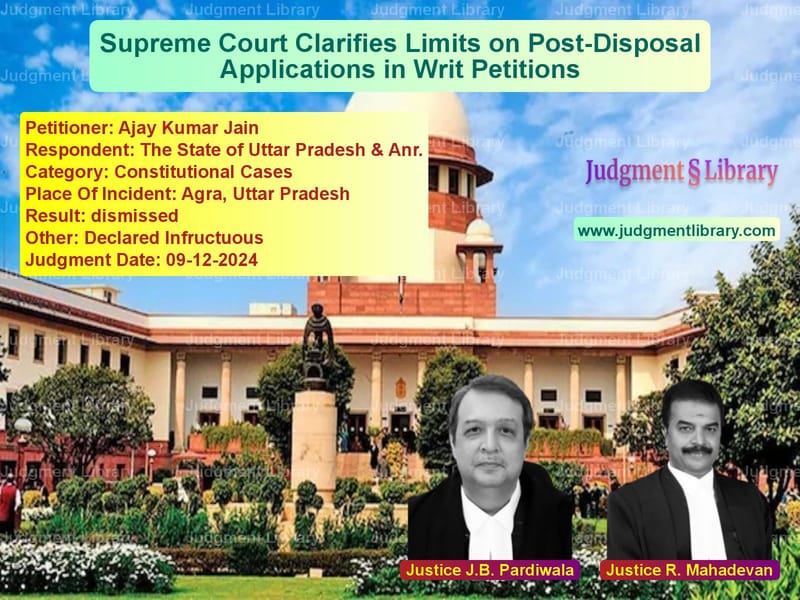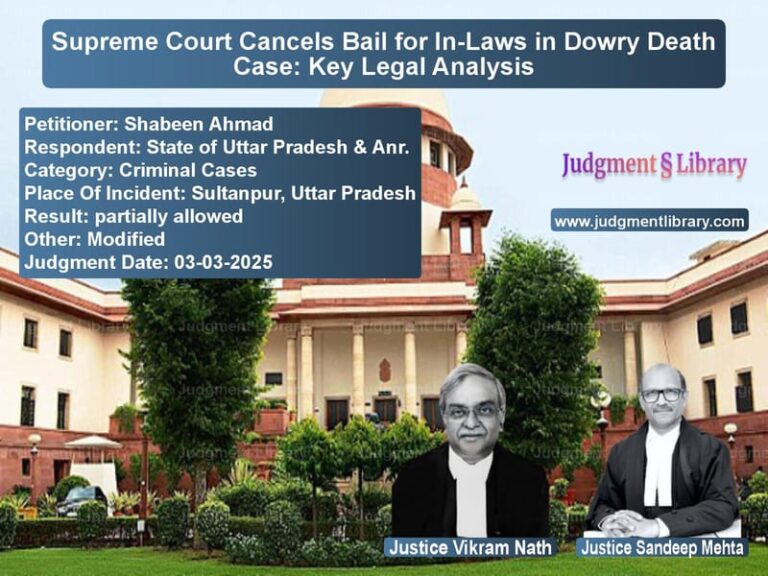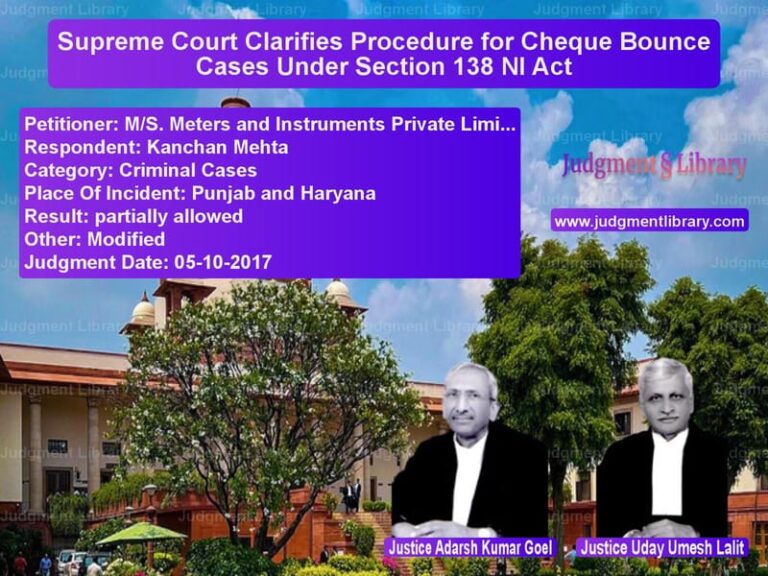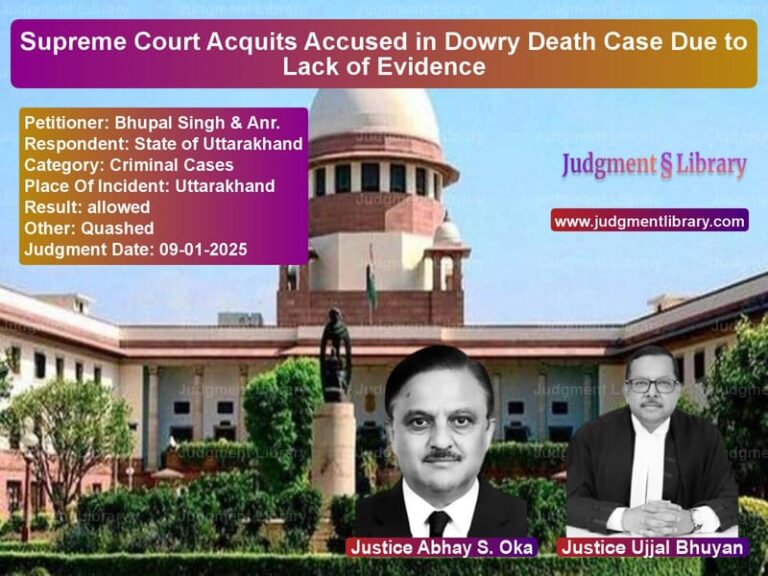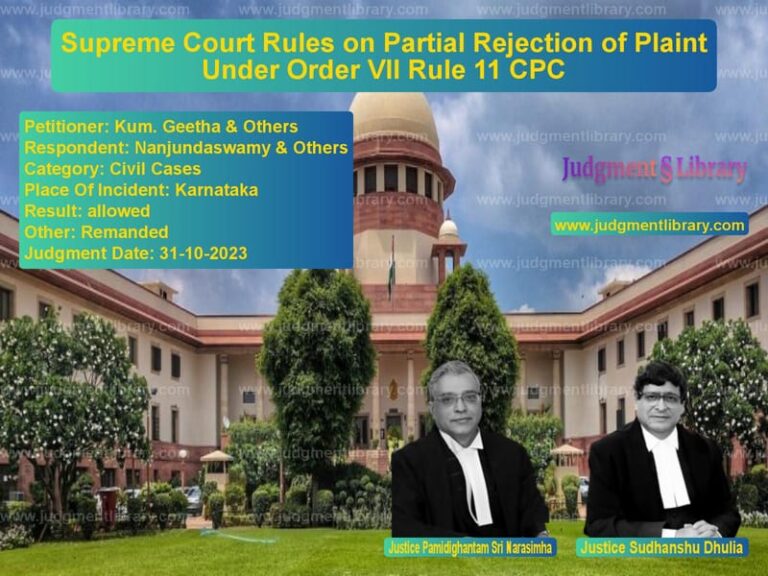Supreme Court Clarifies Limits on Post-Disposal Applications in Writ Petitions
The Supreme Court of India, in the case of Ajay Kumar Jain vs. The State of Uttar Pradesh & Anr., has delivered a landmark ruling on the maintainability of post-disposal applications in writ petitions. The judgment, authored by J.B. Pardiwala and R. Mahadevan, reaffirms the fundamental principle that once a writ petition is finally disposed of, it cannot be reopened through a miscellaneous application unless specific legal grounds are met.
This ruling serves as a guiding precedent for maintaining the finality of judicial orders and ensuring that courts do not become forums for repeated litigation on the same issues. The Court categorically dismissed the petitioner’s miscellaneous application and provided clear directions on the procedural limitations of post-disposal applications.
Background of the Case
The case originated from Writ Petition (Civil) No. 429 of 2020, which was filed by the petitioner seeking relief against alleged threats and harassment in an ongoing civil dispute. The Supreme Court had disposed of the writ petition on August 6, 2021, after directing the District Judge, Agra, to expedite contempt proceedings related to the petitioner’s grievances.
Despite the Supreme Court’s clear directive, the petitioner later filed a miscellaneous application seeking further relief, including additional police protection due to alleged threats from the contemnor. This raised an important legal question about whether a disposed-of writ petition could be reopened through a miscellaneous application.
Legal Issues Considered
- Can a miscellaneous application be filed in a disposed-of writ petition?
- Under what circumstances can a court modify or clarify a previous order?
- Is there a jurisdictional limit on courts reopening proceedings after final disposal?
- Does the petitioner have alternative remedies available under the law?
Arguments by the Petitioner
The petitioner, appearing in-person, argued:
- Despite the Supreme Court’s previous orders, the relief sought had not been fully implemented.
- The contemnor continued to pose a threat to him and his family.
- Since the writ petition originally dealt with protection concerns, the Supreme Court should revive proceedings to ensure enforcement.
- The power of judicial review allows the Supreme Court to intervene when its previous orders are not being effectively implemented.
Arguments by the Respondent (State of Uttar Pradesh)
The State of Uttar Pradesh, represented by Additional Solicitor General, countered:
- The writ petition was finally disposed of, and reopening proceedings through a miscellaneous application was not legally permissible.
- The petitioner had the option of filing a fresh writ petition under Article 226 before the High Court if he still required protection.
- Allowing such applications would compromise judicial efficiency and lead to endless litigation on the same issues.
- Finality of judicial orders is a fundamental principle of the legal system, and the Supreme Court should not entertain applications that attempt to reopen settled matters.
Supreme Court’s Observations
On Maintainability of Miscellaneous Applications
The Court laid down a clear principle on the scope of post-disposal applications:
“No miscellaneous application is maintainable in a disposed-of writ petition unless it pertains to clerical or arithmetical errors or involves an executory order that has become impossible to implement due to subsequent events.”
This observation reinforces the idea that courts cannot be expected to act as forums for continuous litigation on matters that have already been settled.
On Finality of Judicial Proceedings
The Supreme Court emphasized the need to uphold the finality of judicial orders:
“When proceedings stand terminated by final disposal of the writ petition, it is not open to the Court to re-open the proceedings by means of a miscellaneous application in respect of a fresh cause of action.”
The judgment reiterates that the doctrine of finality is a well-established legal principle that ensures judicial efficiency and prevents endless litigation.
On the Petitioner’s Right to Seek Alternative Remedies
The Court advised the petitioner to explore other legal avenues rather than attempt to revive disposed-of proceedings:
“If the petitioner apprehends threat to himself or his family, he is at liberty to file a writ petition before the High Court seeking protection in accordance with law.”
Final Verdict
The Supreme Court dismissed the miscellaneous application and issued the following directives:
- No further relief could be granted in the disposed-of writ petition.
- The petitioner was advised to approach the High Court under Article 226 for any fresh grievances.
- The Supreme Court Registry was directed to strictly scrutinize future applications to ensure they comply with procedural rules.
Impact of the Judgment
This ruling has significant implications for legal practice:
- Prevents misuse of post-disposal applications: Ensures that courts do not become forums for repeated litigation on settled matters.
- Reinforces judicial efficiency: Strengthens the principle that once a case is disposed of, it cannot be reopened except in exceptional circumstances.
- Clarifies procedural law: Provides clear guidelines on when post-disposal applications are maintainable.
- Encourages proper use of alternative remedies: Directs litigants to follow appropriate legal channels instead of misusing miscellaneous applications.
The judgment serves as a crucial precedent in constitutional law, reaffirming the limits of judicial review and ensuring that the integrity of the legal system remains intact.
Petitioner Name: Ajay Kumar Jain.Respondent Name: The State of Uttar Pradesh & Anr..Judgment By: Justice J.B. Pardiwala, Justice R. Mahadevan.Place Of Incident: Agra, Uttar Pradesh.Judgment Date: 09-12-2024.
Don’t miss out on the full details! Download the complete judgment in PDF format below and gain valuable insights instantly!
Download Judgment: ajay-kumar-jain-vs-the-state-of-uttar-p-supreme-court-of-india-judgment-dated-09-12-2024.pdf
Directly Download Judgment: Directly download this Judgment
See all petitions in Public Interest Litigation
See all petitions in Fundamental Rights
See all petitions in Separation of Powers
See all petitions in Judgment by J.B. Pardiwala
See all petitions in Judgment by R. Mahadevan
See all petitions in dismissed
See all petitions in Declared Infructuous
See all petitions in supreme court of India judgments December 2024
See all petitions in 2024 judgments
See all posts in Constitutional Cases Category
See all allowed petitions in Constitutional Cases Category
See all Dismissed petitions in Constitutional Cases Category
See all partially allowed petitions in Constitutional Cases Category

